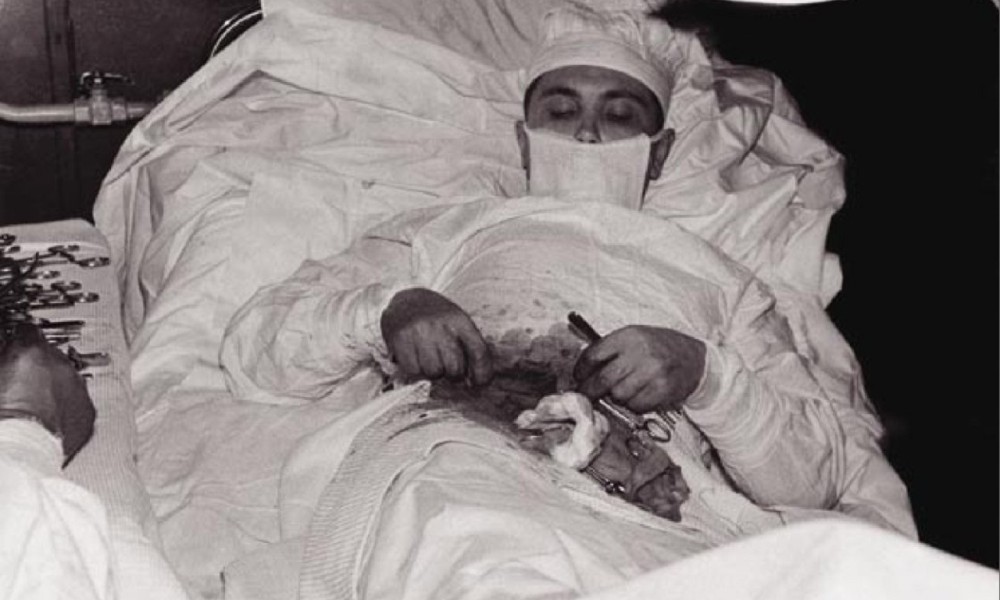
During an expedition to the Antarctic, Russian surgeon Leonid Rogozov, did something that had never been done before in history – He cut out his own appendix.
A team of 12 had been sent to build a new base at the Schirmacher Oasis, as part of the sixth Soviet Antarctic expedition. On completing their mission the team settled down to face the winter months, when Rogozov fell gravely ill. Being a surgeon he diagnosed himself with acute appendicitis. But, being the only surgeon on the team, he had no help.
“I did not sleep at all last night. It hurts like the devil! A snow storm whipping through my soul, wailing like 100 jackals,” he wrote in his diary.
Weighing all the odds of no possibility of help in the cold Antarctic and an appendix about to burst, he made his decision to perform an auto-appendectomy rather than die not doing anything. He did not even know that this was humanly possible.
“Still no obvious symptoms that perforation is imminent, but an oppressive feeling of foreboding hangs over me… This is it… I have to think through the only possible way out – to operate on myself… It’s almost impossible… but I can’t just fold my arms and give up.”
Lesson to be learnt: Plan efficiently when resources are less
Rogozov was systematic and made the best preparations he could;
- He worked out a detailed plan for the operation and assigned his colleagues specific roles and tasks.
- He nominated two main assistants to hand him instruments, position the lamp, and hold a mirror – he planned to use the reflection to see what he was doing.
- The station director was also in the room, in case one of the others became faint.
- He further instructed them on how to inject him with adrenalin and perform artificial ventilation in case he was losing consciousness.
Rogozov wrote after the operation,
“My poor assistants! At the last minute I looked over at them. They stood there in their surgical whites, whiter than white themselves. I was scared too. But when I picked up the needle with the novocaine and gave myself the first injection, somehow I automatically switched into operating mode, and from that point on I didn’t notice anything else.”
He administered a local anaesthetic to his abdominal wall but once he had cut through, removing the appendix had to be done without further pain relief, in order to keep his head as clear as possible. The mirror was of no use as he found its inverted view too much of a hindrance so he ended up working by touch, without gloves. As he reached the final and hardest part of the operation, he almost lost consciousness and began to fear he would fail.
“I grow weaker and weaker, my head starts to spin. Every four to five minutes I rest for 20 – 25 seconds.”
“Finally here it is – the cursed appendage! With horror I notice the dark stain at its base. That means just a day longer and it would have burst… My heart seized up and noticeably slowed, my hands felt like rubber. Well, I thought, it’s going to end badly and all that was left was removing the appendix.”
But, he succeeded. After nearly two hours he had completed the operation, down to the final stitch. He then instructed his assistants on how to wash the surgical instruments and only when the room was clean and tidy did Rogozov take some antibiotics and sleeping tablets.
Rogozov returned to his normal duties just two weeks later.
Rogozov was awarded the Order of the Red Banner of Labour which honoured great deeds and services to the Soviet state and society. His bravery was held up as a symbol to the rest of the world. But, he shunned the publicity and went back to his hospital and resumed his career the very next day of returning home.
Leonid Rogozov’s son, Vladislav Rogozov believes that his father’s legacy is one of inspiration. He says,
“If you find yourself in a seemingly desperate situation when all the odds are against you. Even if you are in the middle of the most hostile environment, do not give up. Believe in yourself and fight, fight for life.”
The story was published as a case report in BMJ; His son Vladislav Rogozov spoke to BBC witness recently and shared his experience.
Photo: Leonid Rogozov during the operation. Photo Credits: Vladislav Rogozov

